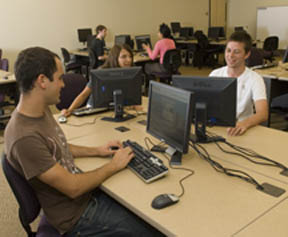Computing Facilities

CS Undergraduate Students Enjoy Multiple High Tech Labs
A top-rated program requires first-rate instructional laboratories, and that is exactly what we have in the Computer Science Department at Purdue. With generous corporate support from Intel, State Farm, and others, we have been able to create unique team projects labs as well as outstanding workstation laboratories – all with new dual-core processors and enough gigabytes of memory to keep even Windows happy. One of the team project labs features interactive smartboards: Any of the five workstations in each team "pod" can be connected to its own smartboard. With electronic markers and built-in projectors, the smartboards allow team members to go over designs together, do code reviews, and make presentations, all to get the bugs out and keep the project on track.
CS Facilities — General Overview
The department is dedicated to providing high-quality computing facilities for use by computer science faculty, students, and administrative personnel. The facilities are operated by a technical staff who are not only responsible for the installation and maintenance of the systems, but who also assist faculty and students in the development of software systems for research projects. The staff includes a director, facilities manager, administrative assistant, network engineer, hardware engineer, six system administrators, and several student assistants.
General Facilities
General computing facilities are available for both administrative activities (such as the preparation of research reports and technical publications) and research needs that are not supported by other dedicated equipment. The main systems each have 512 MB to 8 GB of main memory and a total of over 10 TB of disk storage. All faculty and many graduate students have a Sun, Intel, or Apple (Mac) workstation on their desk.
Educational Facilities
Computing systems used by students enrolled in both undergraduate and graduate computer science courses include over 60 Sun workstations and 100 Intel PCs running Windows XP, Linux, Solaris x86, or Solaris Sparc OS. Two Labs in the Computer Science Building feature Intel machines running Windows XP. CS also has one lab with Intel machines running Linux. Another lab in the CS building and two labs in the Physics building feature Sun hardware running Solaris. The CS lab in the Recitation building features Intel workstations also running Solaris. CS facilities are dedicated to laboratory-based instruction. A later section lists equipment owned and maintained by ITaP but used by computer science students.
I/O Equipment
The department operates both special-purpose output devices as well as general output equipment, including more than 75 laser printers, color printers, color scanners, copiers, video projectors, digital video editing capabilities, phone and video conferencing equipment.
Networking Services
The department is strongly committed to state-of-the-art networking technology to provide access to and communication among its systems, as well as to those elsewhere on campus and throughout the world. Over (65) 1000 Mbps and 100 Mbps Ethernet switches installed in the Computer Science Building connect the departmental 1GB network infrastructure to the departmental computing facilities. Experimental wireless networks and production wireless networks are also active in the building. A dual gigabit link connects departmental systems to other systems on campus, as well as to the Internet community via both "commodity" and Internet2/I-Light connections. ADSL, cable, and cellular data services are widely used for remote access.
Purdue Information Technology (Purdue IT)
In addition to the facilities described above, students and faculty have access to computing systems owned and operated by Purdue IT. General instructional facilities operated by Purdue IT include large Sun SPARCservers and several Sun and Intel workstation laboratories. In addition, Purdue IT provides systems for use in courses taught by the CS Department. These systems include UNIX-based Sun SPARC stations for undergraduate computer science courses and Microsoft Windows-based Intel personal computers for use in an introductory course for non-majors (CS 110). Departmental research projects make use of other facilities provided by Purdue IT. These include a large IBM SP cluster and the Envision Center for Data Perceptualization.